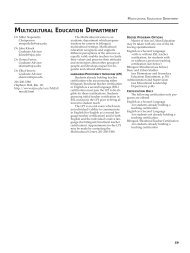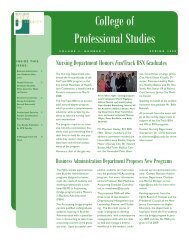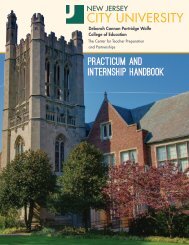Graduate Catalog - New Jersey City University
Graduate Catalog - New Jersey City University
Graduate Catalog - New Jersey City University
You also want an ePaper? Increase the reach of your titles
YUMPU automatically turns print PDFs into web optimized ePapers that Google loves.
20 GRADUATE CATALOG 2013-2016 NEW JERSEY CITY UNIVERSITY<br />
STUDENT RECORDS<br />
<strong>New</strong> <strong>Jersey</strong> <strong>City</strong> <strong>University</strong> maintains<br />
academic and health records of all students<br />
enrolled in the <strong>University</strong>. Additionally,<br />
financial records, as required by federal<br />
and state regulations, are maintained on all<br />
students who receive financial assistance<br />
through the <strong>University</strong>.<br />
ACCESS TO STUDENT RECORDS<br />
For the purposes of compliance with the<br />
Family Educational Rights and Privacy<br />
Act (FERPA), the <strong>University</strong> considers all<br />
students enrolled in the <strong>University</strong> as<br />
independent.<br />
The Family Educational Rights and<br />
Privacy Act of 1974 afford students certain<br />
rights with respect to their education<br />
records.They are:<br />
1. The right to inspect and review the<br />
student’s education records within 30<br />
(thirty) calendar days of the day the<br />
<strong>University</strong> receives a request for access.<br />
<strong>Graduate</strong> students should submit to the<br />
Director of <strong>Graduate</strong> Studies and Continuing<br />
Education, or to other appropriate<br />
officials, written requests that identify<br />
the records(s) they wish to inspect. The<br />
<strong>University</strong> official will make arrangements<br />
for access and notify the student<br />
of the time and place where the records<br />
may be inspected. If the records are not<br />
maintained by the <strong>University</strong> official to<br />
whom the request was submitted, that<br />
official shall advise the student of the correct<br />
official to whom the request should<br />
be addressed.<br />
2. The right to request the amendment of<br />
the student’s education records that the<br />
student believes are inaccurate or misleading.<br />
Students may ask the <strong>University</strong><br />
to amend a record that they believe is inaccurate<br />
or misleading. They should write<br />
the <strong>University</strong> official responsible for the<br />
record, clearly identify the part of the<br />
record they want to change, and specify<br />
why it is inaccurate or misleading.<br />
FERPA was not intended to provide a<br />
process to be used to question substantive<br />
judgments which are correctly recorded.<br />
The rights of challenge are not intended<br />
to allow students to contest, for example,<br />
a grade in a course because they felt a<br />
higher grade should have been assigned.<br />
If the <strong>University</strong> decides not to amend<br />
the record as requested by the student,<br />
the appropriate office in the <strong>University</strong><br />
will notify the student of the decision and<br />
advise the student of his or her right to a<br />
hearing regarding the request for amendment.<br />
Additional information regarding<br />
the hearing procedures will be provided<br />
to the student when notified of the right<br />
to a hearing.<br />
3. The right to consent to disclosures of<br />
personally identifiable information<br />
contained in the student’s education<br />
records, except to the extent that FERPA<br />
authorizes disclosure without consent.<br />
In most cases, students must consent to<br />
the disclosure of personally identifiable<br />
information to a third party, in writing.<br />
One exception which permits disclosure<br />
without consent is disclosure to school<br />
officials with legitimate educational<br />
interests. A school official is a person<br />
employed by the <strong>University</strong> in an administrative,<br />
supervisory, academic, research,<br />
or support staff position (including law<br />
enforcement unit personnel and health<br />
staff ); a person or company with whom<br />
the <strong>University</strong> has contracted (such as<br />
an attorney, auditor, collection agent, or<br />
official of the National Student Clearinghouse);<br />
a person serving on the Board of<br />
Trustees; or a student serving on an official<br />
committee, such as a disciplinary or<br />
grievance committee, or assisting another<br />
school official in performing his or her<br />
tasks. A school official has a legitimate<br />
educational interest if the official needs<br />
to review an education record in order to<br />
fulfill his or her professional responsibility.<br />
The <strong>University</strong> may disclose education<br />
records in certain other circumstances:<br />
a. to appropriate parties to comply with<br />
a judicial order or a lawfully issued<br />
subpoena (Unless a court order has<br />
ordered that the existence of the subpoena<br />
not be disclosed, the <strong>University</strong><br />
will attempt to inform the student of<br />
the subpoena, by letter to his/her last<br />
known address, prior to the requested<br />
documents being released.);<br />
b. to appropriate parties in a health or<br />
safety emergency;<br />
c. to officials of another school, upon<br />
request, in which a student seeks or<br />
intends to enroll;<br />
d. to <strong>University</strong> and other appropriate<br />
officials in connection with a student’s<br />
request for or receipt of financial aid,<br />
to determine the eligibility, amount,<br />
or conditions of the financial aid, or<br />
to enforce the terms and conditions of<br />
the aid;<br />
e. to certain officials of the U.S. Department<br />
of Education, the Comptroller<br />
General’s office, or to state and local<br />
educational authorities, in connection<br />
with certain state or federally supported<br />
education programs;<br />
f. to accrediting organizations to carry<br />
out their functions;<br />
g. to organizations conducting certain<br />
studies for or on behalf of the <strong>University</strong>;<br />
h. to the alleged victim of a crime of<br />
violence or a non-forcible sex offence<br />
when the crime was allegedly committed<br />
by the student; the <strong>University</strong> may<br />
disclose the results of an institutional<br />
disciplinary proceeding with respect<br />
to the crime which shall include only<br />
the name of the student, the violation<br />
committed, the sanction imposed and<br />
the name of another student, such<br />
as victim or witness, only with the<br />
consent of the student;<br />
i. to the parent(s) or legal guardian the<br />
violation of any law or <strong>University</strong><br />
rule or policy governing the use or<br />
possession of alcohol or a controlled<br />
substance if the student is under 21<br />
years of age and the <strong>University</strong> determines<br />
that the student has committed<br />
a disciplinary violation with respect to<br />
use or possession.<br />
4. The right to file a complaint with the<br />
U.S. Department of Education concerning<br />
alleged failures by the <strong>University</strong> to<br />
comply with the requirements of FERPA.<br />
The name and address of the Office that<br />
administers FERPA is: Family Policy<br />
Compliance Office, U.S. Department of<br />
Education, 400 Maryland Avenue, S.W.,<br />
Washington, DC, 20202-4605.<br />
DIRECTORY INFORMATION<br />
The <strong>University</strong> may disclose the following<br />
categories of student information, designated<br />
as public information: the student’s<br />
name, address, phone number, e-mail,<br />
age, major field of study, degree sought,<br />
expected date of completion of degree<br />
requirements and graduation, degrees and<br />
awards received, dates of attendance, fullor<br />
part-time enrollment status, the previous<br />
educational agency or institution attended,<br />
participation in officially recognized<br />
activities and sports, weight and height of<br />
athletic team members, and other similar<br />
information and photographs.<br />
Students may restrict the release of public<br />
information, except to school officials with<br />
legitimate educational interests. To do so,<br />
a student must make the request in writing


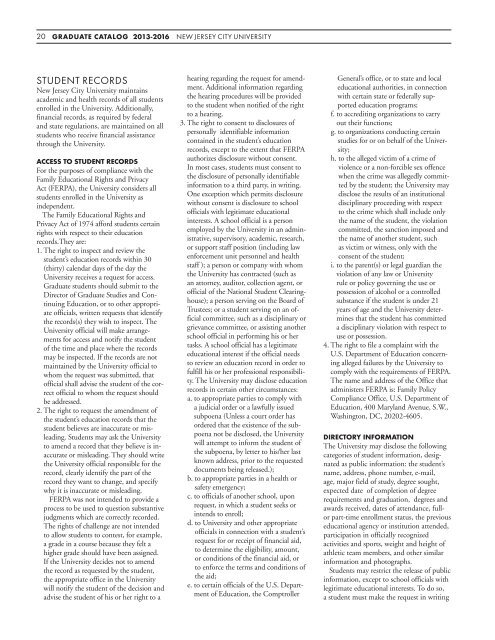
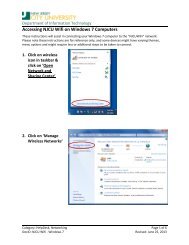
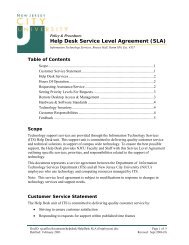




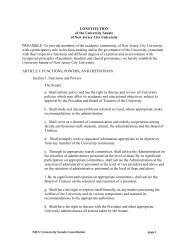
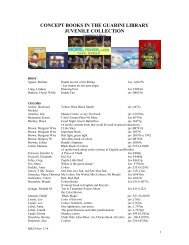
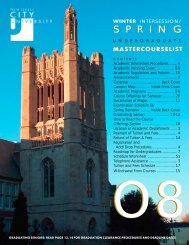
![UACHS 9th English Unit- Feed[1] - New Jersey City University](https://img.yumpu.com/46563190/1/190x245/uachs-9th-english-unit-feed1-new-jersey-city-university.jpg?quality=85)
